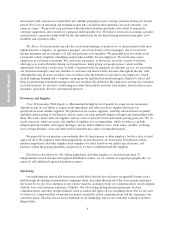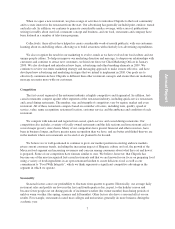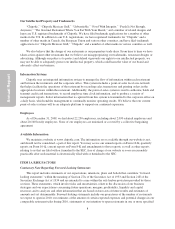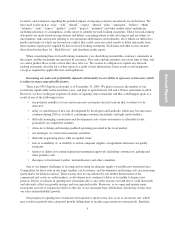Chipotle 2009 Annual Report Download - page 18
Download and view the complete annual report
Please find page 18 of the 2009 Chipotle annual report below. You can navigate through the pages in the report by either clicking on the pages listed below, or by using the keyword search tool below to find specific information within the annual report.
based on a number of assumptions and factors, including historical trends, actuarial assumptions and economic
conditions, and is closely monitored and adjusted when warranted by changing circumstances. Our history of
claims experience is short and our significant growth rate could affect the accuracy of estimates based on
historical experience. Should a greater amount of claims occur compared to what was estimated or medical costs
increase beyond what was expected, our accrued liabilities might not be sufficient and we may be required to
record additional expense. Unanticipated changes may also produce materially different amounts of expense than
that reported under these programs, which could adversely impact our results of operations.
The impact on us of continuing economic uncertainty may be exacerbated if our suppliers, landlords and
other counterparties are not able to continue to do business with us or are forced to alter the terms on which
they do business with us.
Some of our suppliers and other vendors have been adversely impacted by tightening of the credit markets,
decreased economic activity, fluctuations in commodity prices and other consequences of ongoing economic
difficulties. Some vendors have sought to change the terms on which they do business with us in order to lessen
the impact of the economic environment on their business. If we are forced to find alternative vendors for key
services, whether due to demands from the vendor or the vendor’s bankruptcy or ceasing operations, that could
be a distraction to us and adversely impact our business.
For example, we are aware that the economic environment has forced some food suppliers to seek financing
in order to stabilize their businesses, and some suppliers have ceased operations completely. Additional suppliers
may encounter difficulties in sustaining their business, and if any of our major suppliers or a large number of
other suppliers suspend or cease operations, we may not be able to further our Food With Integrity initiative and
may have difficulty keeping our restaurants fully supplied with the high quality ingredients we require. If we
were forced to suspend serving one or more of our menu items, that could have a significant adverse impact on
our restaurant traffic and public perceptions of us, which would be harmful to our business.
Similarly, our restaurant expansion strategy relies in part on the development of new retail centers and
similar projects. Many developers rely on the availability of financing to complete these types of projects, and
due to current conditions in the credit and commercial real estate markets financing may not be available on
attractive terms or at all. Developers may also delay or cancel projects in light of uncertainty in the commercial
real estate market or economic conditions generally. If developers do not proceed with projects in which we plan
to locate restaurants, our expansion plans may be hampered, which would adversely impact our growth and could
impair our future profitability.
Governmental regulation may adversely affect our ability to open new restaurants or otherwise adversely
affect our existing and future operations and results.
We are subject to various federal, state and local regulations. Each of our restaurants is subject to state and
local licensing and regulation by health, alcoholic beverage, sanitation, food and workplace safety and other
agencies. We may experience material difficulties or failures in obtaining the necessary licenses or approvals for
new restaurants, which could delay planned restaurant openings. In addition, stringent and varied requirements of
local regulators with respect to zoning, land use and environmental factors could delay or prevent development
of new restaurants in particular locations.
We are subject to the U.S. Americans with Disabilities Act and similar state laws that give civil rights
protections to individuals with disabilities in the context of employment, public accommodations and other areas.
We may in the future have to modify restaurants, for example by adding access ramps or redesigning certain
architectural fixtures, to provide service to or make reasonable accommodations for disabled persons. The
expenses associated with these modifications could be material.
We are also subject to various federal and state laws governing our relationship with and other matters
pertaining to our employees, including wage and hour laws, requirements to provide meal and rest periods or
16
Annual Report
























